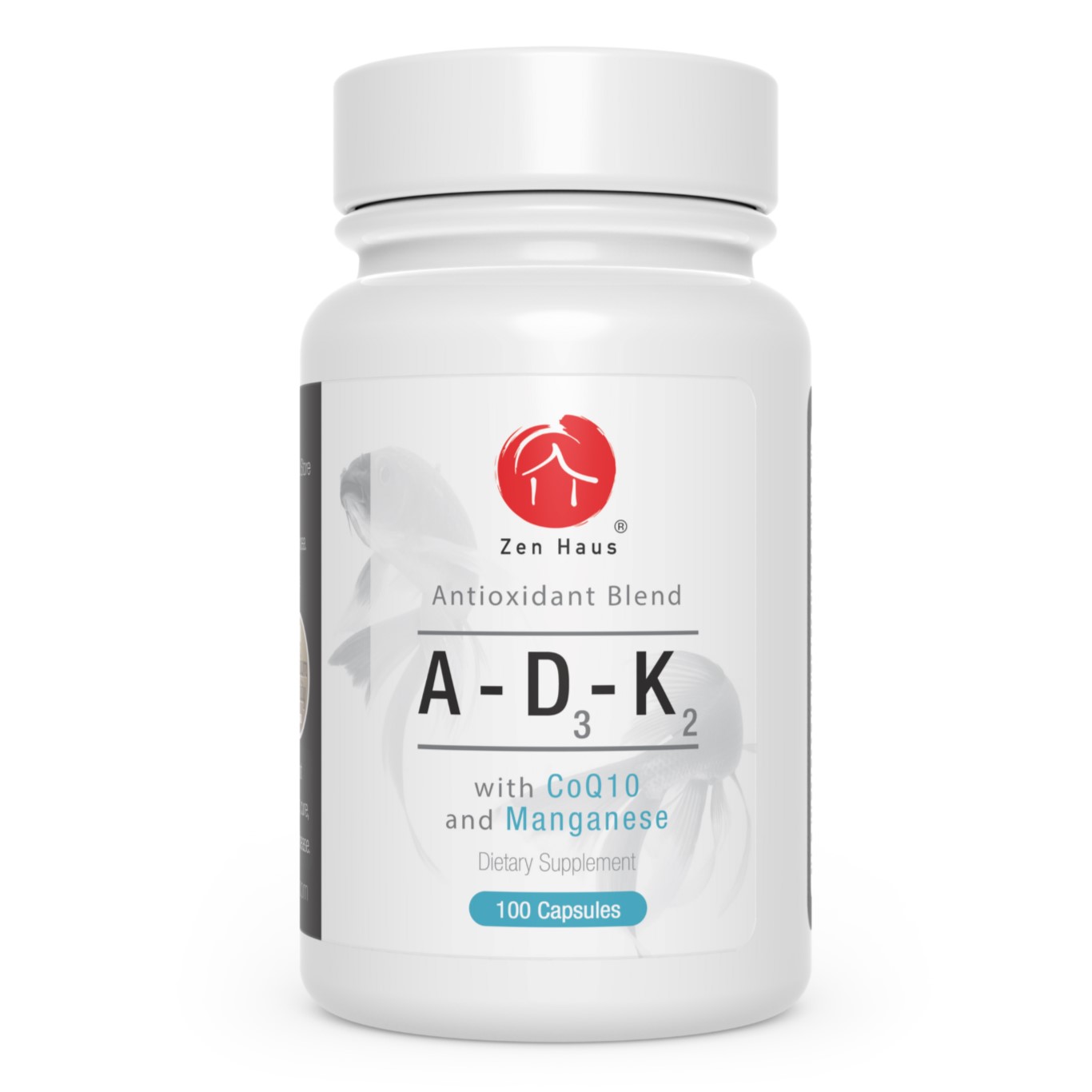Vitamin K
Vitamin K is a fat soluble vitamin that is important for blood clotting and also contributes to a healthy heart, bones and teeth, brain, skin and immune system.
Vitamin K is a cofactor for an enzyme that increases the rate of the carboxylation of glutamic acid. The carboxylation of glutamic acid makes it possible for proteins to be able to bind with calcium, which in turn is important in blood clotting. Calcium binding is also an integral part of bone health and strength.1
There are several different forms of Vitamin K, mainly Vitamin K1 and Vitamin K2, and they behave differently in the body.
Vitamin K1 (phylloquinone) is natural form found in greens and nettle that is used by the liver for proper blood clotting. A small amount is used by the body. Some experts claim that 10% of Vitamin K1 from greens is used by the body.
Vitamin K2 (menaquinone) is a more absorbable form of Vitamin K found in certain fermented foods and supplements. It is used by soft tissues and is helpful for bones, heart tissue and more.

K2 is a product of the fermentation and is created by certain bacteria. It is found in fermented raw grass fed dairy and certain other fermented foods like natto. These foods have more Vitamin K1 than Vitamin K2, however, greater amounts of Vitamin K2 is absorbed in the body. Little Vitamin K2 is usually consumed even in a healthy western diet.
Studies have shown great health and cardiovascular benefits from K2. It supports bone development and helps the body store calcium properly. Some animals can effectively convert K1 to K2, however, humans need dietary sources of K2 to maintain good health.
All the Vitamin Ks are absorbed through the intestinal lining. First, the liver takes all the Vitamin K it needs. Vitamin K not needed by the liver goes to your blood, where it is distributed to other tissues including bones, muscles, brain, nerves and arteries.
Bones and Teeth
K2 is needed to help calcium and other minerals bind into the bone matrix to strengthen bones. Otherwise these minerals will stay in soft tissue where it can cause calcification. Studies suggest Vitamin K is effective at slowing bone loss in people with osteoporosis and in some cases can reverse it as well.2
Our bones need osteocalcin to absorb calcium. Osteocalcin is released by osteoblasts (bone building cells) and binds to calcium. Osteocalcin requires Vitamin K2 to become fully activated so that it can bind to calcium.3 Osteocalcin also stimulates the growth of new dentin, which makes your teeth stronger.4,5 Dr. Weston A. Price identified Vitamin K was one of the vitamins that is vital for tooth remineralization and the prevention of cavities.
Vitamin K2 maintains and improves bone mineral density. In studies completed on post-menopausal women, participants with a higher level of Vitamin K2 helped prevent bone fractures6 and improve bone strength.7 Studies have found up to an 80% reduction in fractures in osteoporosis patients with Vitamin K2 supplements.8
If the bones aren’t taking in calcium, then more of it is getting stuck in your arteries, which cause them to harden. For these reasons Vitamin K2 deficiency can lead to both arterial defects and osteoporosis.9
Low levels of Vitamin K are also linked to increased inflammation, fractures, and bone pain.10
Brain
The same process that makes Vitamin K helpful for preventing calcification of arteries and muscle tissue may also help protect the brain. Calcification can also occur in the brain, including the pineal gland, and create blockages in the blood pathways providing oxygen to the brain. The calcification of the pineal gland and reduced oxygen to the brain reduces cognitive abilities.
Cognition
Vitamin K may support the nervous system by protecting it from damage caused by calcium deposits. This benefit primarily supports cognitive functions in older users.11
Skin
Vitamin K2 is also promising for skin health and anti-aging because it can help stop the accumulation of excess calcium in the skin. The excess calcium makes the skin less elastic. Skin cells release the matrix-GLA protein to prevent calcification of elastin in the skin. This protein is activated by Vitamin K2. We can then conclude that Vitamin K2 helps keep the skin elastic and prevent wrinkles.
2011 research showed that women with extensive wrinkles were also more likely to have low bone mass. Other research has shown that Japanese women were less likely to have wrinkles than other cultures.12 Note that nattō, which is fermented soy with high amounts of Vitamin K2, is generally part of the diet of Japanese women.
Diabetes
One study demonstrated that both Vitamin K1 and Vitamin K2 reduced the risk of developing diabetes. However, the stronger and more significant association was with Vitamin K2, which reduced the risk of type II diabetes by 7% for each 10-microgram increase in intake.13
Human supplementation studies indicate that Vitamin K2 is effective in combating the effects of diabetes. In a study of healthy young men, after four weeks of supplementation with Vitamin K2 daily improved insulin sensitivity.14 This may have occurred as a result of an increase in the Vitamin K dependent osteocalcin, which had been shown in animal studies to increase insulin secretion and sensitivity. 15
Immune
Gas6 is a Vitamin K dependent protein which has been closely associated with the nervous system.16 Gas6 modulates microglia which are the primary immune effectors of the central nervous system and are at the core of tissue maintenance and repair. They accomplish important phagocytic functions, removing pathogens, cellular debris, and apoptotic cells that accumulate over time. In addition, microglial cells secrete cytotoxic substances such as cytokines and reactive oxygen species that they use to protect the brain from infectious organisms.
Energy
Bones release osteocalcin during exercise and seem to send out messages to help muscles cope with increased energy demands. The Vitamin K2 protein allows skeletal muscle to use energy during exercise, increasing the efficiency of the work out and potential performance.17
Inflammation
Chronic inflammation is the source of many diseases, including cancer, obesity, and heart disease. Inflammation is also a crucial component of many chronic aging diseases. Evidence suggest Vitamin K has an anti-inflammatory properties that is independent of its role as an enzyme co-factor.18 Vitamin K dependent proteins and inflammation have been associated with cardiovascular disease and osteoarthritis, which are leading causes of disability and mortality in older adults.
Summary
Vitamin K has far reaching benefits in the body and without the help of other nutrients it can make significant contributions to holistic health. This meets our criteria for a worthwhile supplement and since it also works well with Vitamin D we have combined them in the Zen Haus ADK Supplement. This simplifies supplementing strategies while also boosting efficacy. Learn more about the Vitamin K and Vitamin D synergies in the ADK Synergies post.
.
.


